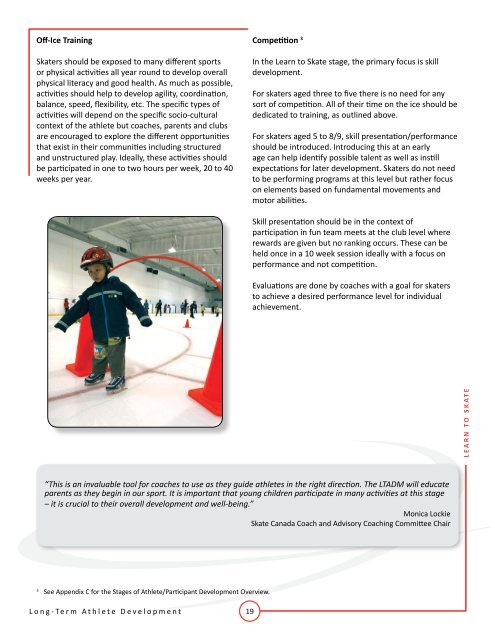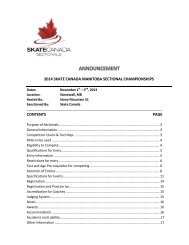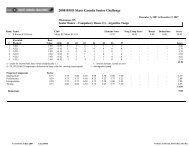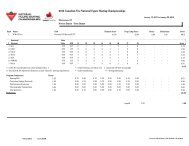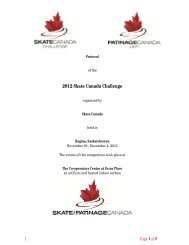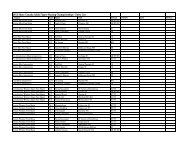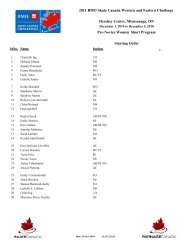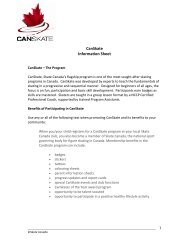LONG-TERM ATHLETE DEVELOPMENT - Skate Canada
LONG-TERM ATHLETE DEVELOPMENT - Skate Canada
LONG-TERM ATHLETE DEVELOPMENT - Skate Canada
Create successful ePaper yourself
Turn your PDF publications into a flip-book with our unique Google optimized e-Paper software.
Off-Ice Training<br />
<strong>Skate</strong>rs should be exposed to many different sports<br />
or physical activities all year round to develop overall<br />
physical literacy and good health. As much as possible,<br />
activities should help to develop agility, coordination,<br />
balance, speed, flexibility, etc. The specific types of<br />
activities will depend on the specific socio-cultural<br />
context of the athlete but coaches, parents and clubs<br />
are encouraged to explore the different opportunities<br />
that exist in their communities including structured<br />
and unstructured play. Ideally, these activities should<br />
be participated in one to two hours per week, 20 to 40<br />
weeks per year.<br />
L o n g - Te r m A t h l e t e D e v e l o p m e n t<br />
865 Sheord Road, Ottawa, Ontario K1J 1H9<br />
Phone 613.747.1007 I Toll Free 1.888.747.2372 I Fax 613.748.5718 I Toll Free Fax 1.877.211.2372<br />
19<br />
Competition 3<br />
In the Learn to <strong>Skate</strong> stage, the primary focus is skill<br />
development.<br />
For skaters aged three to five there is no need for any<br />
sort of competition. All of their time on the ice should be<br />
dedicated to training, as outlined above.<br />
For skaters aged 5 to 8/9, skill presentation/performance<br />
should be introduced. Introducing this at an early<br />
age can help identify possible talent as well as instill<br />
expectations for later development. <strong>Skate</strong>rs do not need<br />
to be performing programs at this level but rather focus<br />
on elements based on fundamental movements and<br />
motor abilities.<br />
Skill presentation should be in the context of<br />
participation in fun team meets at the club level where<br />
rewards are given but no ranking occurs. These can be<br />
held once in a 10 week session ideally with a focus on<br />
performance and not competition.<br />
Evaluations are done by coaches with a goal for skaters<br />
to achieve a desired performance level for individual<br />
achievement.<br />
“This is an invaluable tool for coaches to use as they guide athletes in the right direction. The LTADM will educate<br />
parents as they begin in our sport. It is important that young children participate in many activities at this stage<br />
– it is crucial to their overall development and well-being.”<br />
Monica Lockie<br />
<strong>Skate</strong> <strong>Canada</strong> Coach and Advisory Coaching Committee Chair<br />
3 See Appendix C for the Stages of Athlete/Participant Development Overview.<br />
L E A R N T O S K A T E


